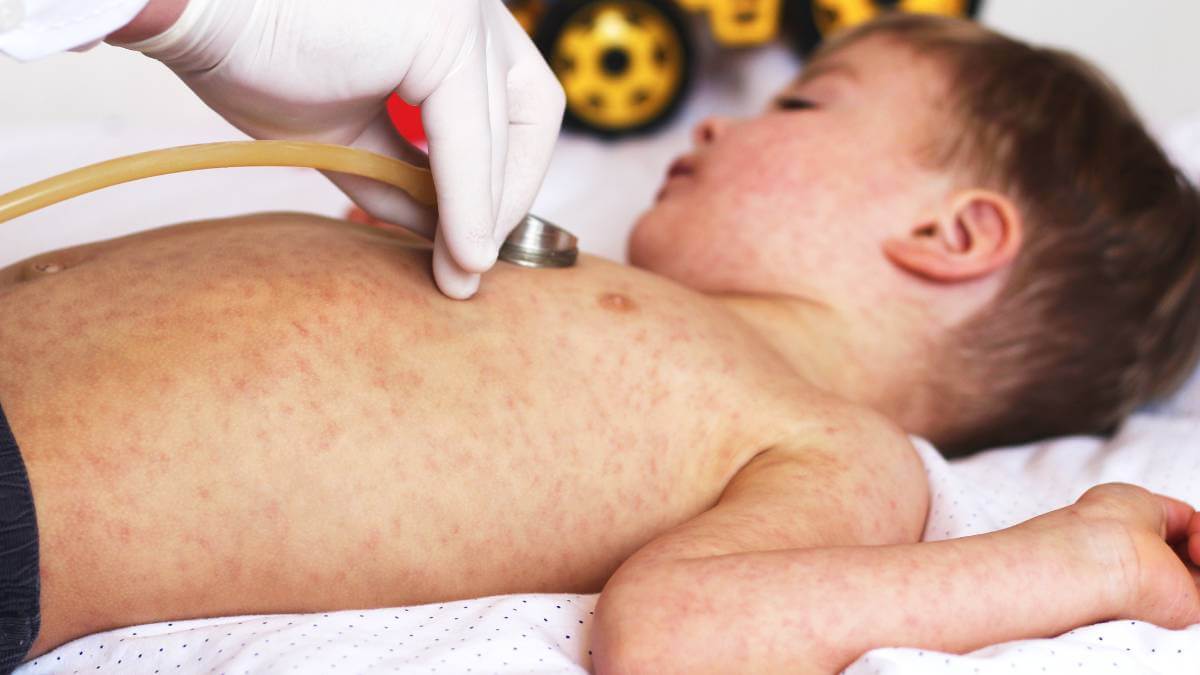Health authorities have warned people to stay alert for signs and symptoms of measles after several cases were diagnosed over the past week.
A case of measles was identified in a returned overseas traveller who attended a number of sites in south-east Melbourne from 17 January 2024 while infectious.
And in NSW two babies and an adult have been confirmed as having the virus. Both babies had travelled overseas, but not together and the adult had also returned from overseas.
The adult also travelled to Canberra after arriving in Sydney.
If you or someone you know is experiencing measles symptoms you should make an appointment with your doctor or call Healthdirect on 1800 022 222.
Australia was declared free of measles in 2014. Any cases detected in the country since then have usually been brought in from overseas from countries experiencing outbreaks.
What is measles and why is it dangerous?
Measles is a highly contagious viral illness. It can be spread through coughing and sneezing. However, the virus has been shown to survive in the air for a couple of hours, so you can simply breathe it in. This is especially true for enclosed spaces such as lifts and hallways.
Most cases of measles will simply run their course with relatively mild symptoms, however, there can also be serious complications such as pneumonia and encephalitis.
According to government figures, about one in 15 children with measles develops pneumonia and one in 1000 develops encephalitis. For every 10 children who develop measles encephalitis, one dies and up to four have permanent brain damage.
It is also dangerous for pregnant women who are not immunised. Women who catch measles while pregnant are at risk of miscarriage or pre-term labour.
What are the symptoms?
Once exposed to the virus, it can take 10 to 18 days for symptoms to appear.
Measles will start off looking like a cold with symptoms including a fever, runny nose, cough, sore or red eyes and fatigue. You may also have white spots in your mouth.
Two to three days after the initial symptoms, the distinctive rash will appear. It usually starts on the head, before spreading to the rest of the body.
Once symptoms appear, you can expect to be sick for about a week. If you have a cough, that may last up to two weeks.
When should you see a doctor?
Regardless of how serious your condition is, if you suspect you have measles, you should contact a GP immediately.
Measles is a nationally notifiable disease, meaning that any doctor diagnosing a case must report it to health authorities.
However, you should ring ahead and ask the clinic for its protocol for measles. Some will only offer a telehealth consultation and others will have rigorous procedures before you are allowed to see a doctor in person.
You should minimise your contact with other people until you have been formally diagnosed and your doctor should advise you on the next steps depending on the severity of your case.
Do you need a booster shot?
The measles, mumps and rubella (MMR) vaccine is 99 per cent effective at preventing the virus. These are usually given to babies at 12 and 18 months.
If you have had a measles vaccine injection, you do not need a booster shot.
If you have had measles before, you don’t need the vaccine.
The measles vaccination program officially began in Australia in the 1970s, although the states and territories had offered it for years before.
If you were born before 1968 and are not sure if you have received the vaccination, or emigrated from another country without a vaccination program, you should talk to your doctor about getting a measles vaccination. The vaccination is free.
Have you ever had measles? Why not share your experience in the comments section below?
Also read: Patients paying huge gap fees for diagnostic imaging

